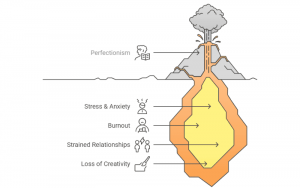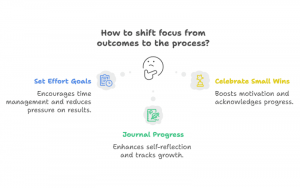Perfectionism can be both a driving force and a heavy burden. While it may push us to strive for excellence, it often traps us in a cycle of anxiety, self-doubt, and constant dissatisfaction. In this blog, Citizen of the World explores the roots of perfectionism, its hidden costs, and explains how to overcome perfectionism at work so you can reclaim joy, peace, and authenticity in your life.
What Is Perfectionism?
Perfectionism is more than just wanting to do well. It’s a belief system where self-worth is tied to achievement, and anything less than flawless feels like failure. This mindset often forms early in life and becomes so ingrained that it feels like a part of our identity.
Signs of perfectionism:
- A harsh inner critic
- Fear of making mistakes
- Procrastination driven by fear of doing it wrong
- All-or-nothing thinking
- Struggles to accept praise or rest
This rigid view of success and failure leaves little room for vulnerability or growth.
Also read: How Individual Psychotherapy Can Help You Overcome Life’s Challenges
How Perfectionism Develops

Conditional Love and Approval
Many perfectionists were praised mainly for achievements rather than for who they were. This teaches the message: “I’m only worthy when I succeed.” Dr. Alice Miller noted that children often become perfectionists when they sense that their caregivers’ affection is tied to their performance.
Dr. Alice Miller, renowned psychoanalyst, noted that children often become perfectionists when they sense that their caregivers’ affesction is tied to their performance.
Family and Cultural Influences
In some families, perfectionism is modeled and expected. Parents may be critical of themselves and others, unintentionally passing on those high standards.
Culturally, we’re bombarded with messages about success, productivity, and image especially in the workplace. That’s why understanding how to overcome perfectionism at work is critical to protect our well-being and self-worth.

The Hidden Costs of Perfectionism
Although perfectionism can seem like a strength, its hidden costs are often destructive:
- Chronic stress and anxiety
- Burnout from never feeling “done”
- Strained relationships due to unrealistic expectations
- Loss of creativity from fear of failure
- Emotional numbness, where joy is replaced by pressure

“Perfectionism is not the path to excellence. Wholehearted living is.” – Brené Brown
How the Inner Critic Fuels Perfectionism
At the root of perfectionism lies the inner critic, a harsh voice that demands more and constantly says, “You’re not good enough.”
Common unconscious beliefs:
- “I’m not enough as I am.”
- “Mistakes make me unworthy.”
- “If I’m not perfect, I’ll be rejected.”
This inner critic often echoes voices from our past: parents, teachers, or culture. Learning how to overcome perfectionism at work means challenging this voice and rewriting your inner narrative.

How to Overcome Perfectionism: Practical Strategies
1. Practice Self-Compassion
According to Dr. Kristin Neff, self-compassion is the most effective antidote to perfectionism. When you make a mistake, say:
“This is hard right now, but suffering is part of being human. May I be kind to myself.”
Self-compassion allows room for growth and reduces fear of failure.
2. Embrace “Good Enough”
Challenge the myth that only perfection is acceptable:
Set time limits and stick to them
Share work before it feels “ready”
Allow small imperfections
“Done is better than perfect.” – Elizabeth Gilbert
This mindset is essential in learning how to overcome perfectionism at work, where perfectionism can cause delays and burnout.
3. Develop a Growth Mindset
Dr. Carol Dweck’s research shows that viewing abilities as learnable builds resilience.
Replace “I’m not good enough” with:
“I’m still learning.”
“I’m improving with every effort.”
“Mistakes help me grow.”
This shift turns challenges at work into opportunities, not threats.
4. Focus on the Process, Not Just the Outcome
Perfectionists often obsess over results. Shift your focus to the journey by:
Setting goals around effort (“I’ll spend 30 minutes on this”)
Celebrating small wins
Journaling your progress

5. Try Deliberate Imperfection
This technique involves doing small things imperfectly on purpose to reduce fear. Try:
Sending a casual email with a minor typo
Posting something unpolished
Leaving part of a task incomplete
You’ll realize the world doesn’t end and your anxiety will gradually ease.
How Psychodynamic Therapy Helps with Perfectionism
While self-help strategies are valuable, deeper healing often requires uncovering the emotional roots of perfectionism. Psychodynamic psychotherapy does just that.
1. Understanding the Origins
Psychodynamic therapy helps connect perfectionism to early experiences—often revealing how it was a strategy to earn approval or avoid criticism.
2. Process Emotional Barriers
Perfectionism protects us from feelings like shame and fear. Therapy creates a safe space to face and release these emotions.
“The perfectionist has learned to substitute achievement for attachment as a source of security.” – Dr. Nancy McWilliams
3. Rewrite the Inner Narrative
Through a compassionate therapeutic relationship, you learn to internalize a new voice one that accepts flaws, values effort, and sees worth beyond results.
Redefining Success Beyond Perfection
Real success isn’t about flawlessness, it’s about living in alignment with your values.
Ask yourself:
What would I do if failure weren’t an option?
What brings me joy, even without recognition?
What does success mean to me, not others?
The Japanese concept of wabi-sabi reminds us that there is beauty in imperfection. Let that be your new standard.
Final Thoughts: Choose Authenticity Over Perfection
Learning how to overcome perfectionism at work is not about lowering your standards. It’s about letting go of self-punishment and embracing growth, humanity, and joy.
When you stop chasing “perfect,” you create space for something richer:
Peace over pressure
Confidence over fear
Connection over performance
You don’t need to be perfect to be loved, successful, or happy. You just need to be real.

If you’re navigating self-doubt, explore our guide on Building Resilience Through Emotional Awareness to support your journey.
At Citizen of the world, we believe you deserve to feel whole exactly as you are. Through both practical tools and deep insight, we support your journey toward a more liberated, grounded, and joyful life.
[1] https://en.wikipedia.org/wiki/Resistance_(psychoanalysis)
[2] https://ifs-institute.com/
[3] https://pubmed.ncbi.nlm.nih.gov/21346631/
